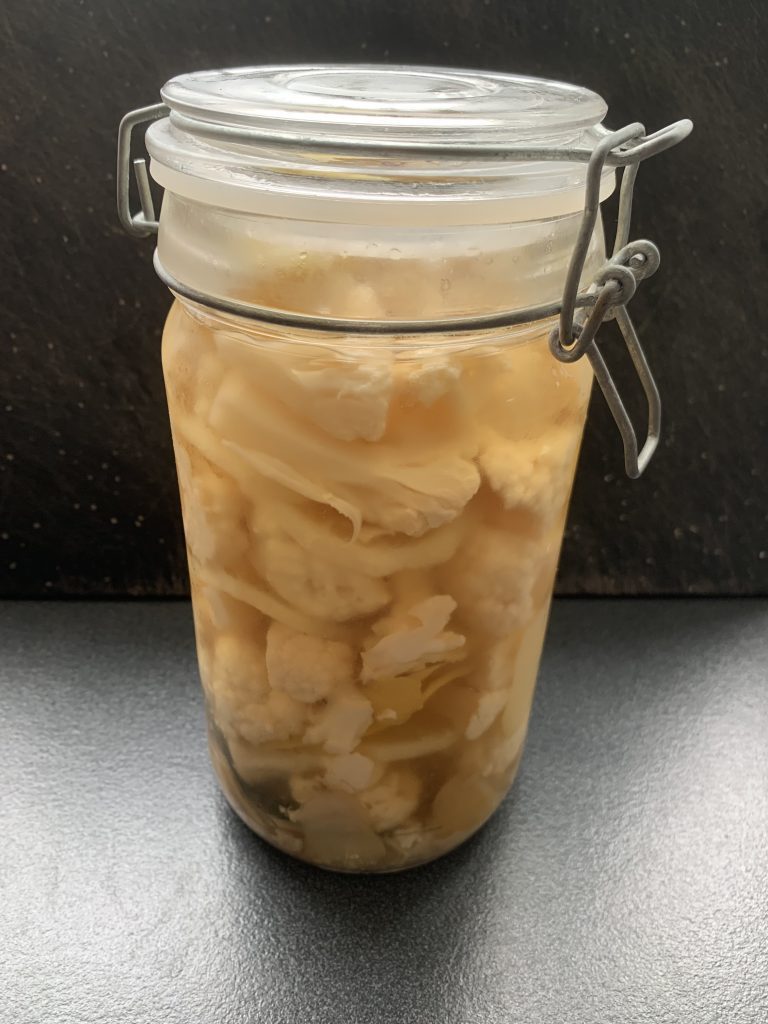author
Jacques Lawinski
PhD candidate in philosophy and ecology at Université Paris VIII, visiting researcher in Lesvos, Greece. A writer, an activist, and an avid walker, I explore the planet and what it means to relate to nature, finding new, ecological ways of being.
post
- 26/02/2023
- No Comments
- Food
share
A delicious pickled cauliflower to put on rice, in salads, or as a side to almost any meal!

Ingredients
1/2 head of cauliflower
1 cup apple cider vinegar
1.5 cups water
2 tsp salt
1 lemon
1/2 tsp peppercorns
Method
- Cut up the cauliflower into small pieces, trying to keep the florets together so you have pieces that are easy to take out when it’s finished. Slice up the garlic, and cut slices of lemon rind off the lemon with a sharp knife. Slice up the remaining lemon into thin slices.
- In a medium-sized pan, put the water, vinegar and salt together and bring to the boil.
- Add the cauliflower florets and leave to boil for 5 minutes.
- Take off the heat, and in a large glass jar, add some slices of lemon and some pieces of lemon zest. Top this with some pieces of cauliflower from the pot.
- Continue making layers in this way, and about halfway, add in some of the garlic and peppercorns. Finish with a layer of lemon slices on the top.
- Fill up the jar to the top with the liquid left over in the pan. Use enough to cover the cauliflower completely.
- Let it cool down at room temperature, then put the lid on and put it in the fridge. The pickle will be ready to eat in around 48 hours, but it gets better and more lemony with time!!
Our food section provides ideas and inspiration for great, fresh food. Our recipes will always be open and free for everyone to use, without any advertising.
All our articles are freely accessible because we believe that everyone needs to be able to access to a source of coherent and easy to understand information on the ecological crisis. By eating well, and in ways that have a better impact on the environment, we can begin to change the way the whole society produces food.
If you've learned something today, or feel inspired, please consider donating, to help us produce more great recipes and share this knowledge with a wider audience.
Subscribe
0 Comments
Inline Feedbacks
View all comments
Why plurality.eco?
Our environment is more than a resource to be exploited. Human beings are not the ‘masters of nature,’ and cannot think they are managers of everything around them. Plurality is about finding a wealth of ideas to help us cope with the ecological crisis which we have to confront now, and in the coming decades. We all need to understand what is at stake, and create new ways of being in the world, new dreams for ourselves, that recognise this uncertain future.
Copyright © Plurality.eco 2023
Manage Cookie Consent
To provide the best experiences, we use technologies like cookies to store and/or access device information. Consenting to these technologies will allow us to process data such as browsing behavior or unique IDs on this site. Not consenting or withdrawing consent, may adversely affect certain features and functions.
Functional Toujours activé
The technical storage or access is strictly necessary for the legitimate purpose of enabling the use of a specific service explicitly requested by the subscriber or user, or for the sole purpose of carrying out the transmission of a communication over an electronic communications network.
Preferences
The technical storage or access is necessary for the legitimate purpose of storing preferences that are not requested by the subscriber or user.
Statistics
The technical storage or access that is used exclusively for statistical purposes.
The technical storage or access that is used exclusively for anonymous statistical purposes. Without a subpoena, voluntary compliance on the part of your Internet Service Provider, or additional records from a third party, information stored or retrieved for this purpose alone cannot usually be used to identify you.
Marketing
The technical storage or access is required to create user profiles to send advertising, or to track the user on a website or across several websites for similar marketing purposes.

